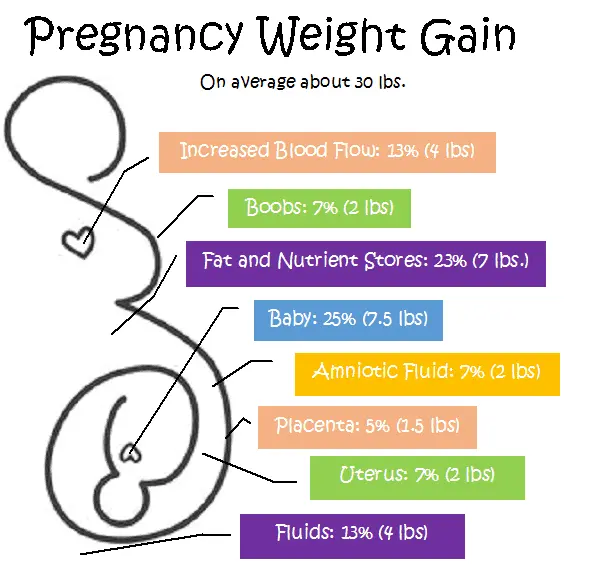I can’t count how many times during my pregnancies people commented how cute and “small” I was, and then in the same day, had someone ask me if I was having twins because I was so “huge.” Obviously, perspectives on how big or small a pregnant woman should be are rather relative, but is there an ideal number for weight gain during pregnancy? Let’s explore the ins and outs of pregnancy weight gain a bit more.
How much weight gain during pregnancy is generally considered normal?
Notice the word, “generally” there, I want to begin by adding that the number on your scale is by no means an accurate judge of the health of your baby. Some women experience very little pregnancy weight gain while others gain a ton—not literally hopefully—and most of those women go on to have happy, healthy babies. It’s important that if your weight gain during pregnancy is below or above the estimates presented here, that you don’t go freaking out. It simply means you might want to stop and evaluate your individual situation to ensure that your baby is getting the best possible environment to grow in.
Average healthy pregnancy weight gain estimates are based on your pre-pregnancy BMI (body mass index calculator).
For a BMI below 18.5: Pregnancy weight gain should be roughly 28 to 40 lbs. in a singleton pregnancy
BMI between 18.5 and 24.9: 25 to 35 lbs.
BMI between 25 and 29.9: 15 to 25 lbs.
BMI above 30: 11 to 20 lbs.
On average, with a twin pregnancy you can add around 10 lbs. to these pregnancy weight gain estimates.
Most women gain between 1 and 5 lbs. during the first trimester, followed by a pound or two a week during the second and third trimesters. By full term, you can expect a 7.5 to 8 lb. baby, a 1.5 lb. placenta, 2 lbs. in amniotic fluid, 4 lbs. in increase blood flow, 2 lbs. in uterine weight, 2 lbs. in breast mass increase, 4 lbs. in other fluids, and 7 lbs. in fat and nutrient stores for an average of about 30 lbs. Naturally, as even baby weight varies greatly, it then makes sense that weight gain during pregnancy also varies.
Why does my pregnancy weight gain matter?
While you might think the major concern with too much weight gain during pregnancy is you’re going to have to lose it later, under and over pregnancy weight gain can actually have an impact on your baby and the ease of your pregnancy.
If you are not gaining sufficient weight, this could lead to poor fetal growth resulting in low birth weight. It’s also possible you’ll be not only neglecting your baby proper nutrition if your caloric intake is too low, but hurt your own health in the process. For example, if you aren’t getting sufficient calcium during pregnancy, your body begins to “steal” it from your bones and teeth. This can lead to dental problems and a weakened skeletal structure. Any nutritional deficiency can have a negative impact on your health and your child’s.
If you are gaining too much weight, you put yourself at a higher risk for preterm labor as they baby may become too large for your womb before he/she has fully developed as well as increase your chance of certain pregnancy complications such as gestational diabetes and preeclampsia. The additional pregnancy weight gain also places additional strain on your body, which may exasperate pregnancy symptoms.
What should I do if my pregnancy weight gain is out of normal range?
As I mentioned in the very beginning of this page, please don’t assume if you are gaining more or less than you should according to the “experts” that there is something wrong with you, your baby, or your pregnancy.
First, have a look at your diet. How well are you eating? Is your diet balanced with fruits, vegetables, whole grains, and lean proteins? How often do you eat out or processed foods? It can help to track your caloric intake for a little while to get an idea how much you are eating and make yourself more aware of what you are eating. I highly recommend MyFitnessPal for this. It’s also great for dieting after your pregnancy. If your caloric intake is more or less than about 300 to 400 calories in addition to your pre-pregnancy needs, that could be your pregnancy weight gain issue. If your caloric intake is great, but full of empty calories or heavily processed and/or fatty foods, that could be the issue.
Second, consider your activity level. The main thing here is to consider two factors: your activity level pre-pregnancy vs now and your activity level vs your caloric intake. For instance, if you were super active prior to pregnancy then went all couch potato, that could explain over gaining or if you were kind of low activity and got on a healthy kick when you became pregnant and started exercising, that could explain under gaining.
If everything is peachy and your weight gain during pregnancy is still under or over the average significantly, chances are nothing is wrong and you’re just one of those folks that gains more or less, but you can bring it up with your care provider to be sure. You may be given an ultrasound to measure the baby and fluid levels or blood testing to check your iron levels and blood sugar, but again, in many cases, it’s just one of those common instances where someone falls outside the range known as “normal.”


